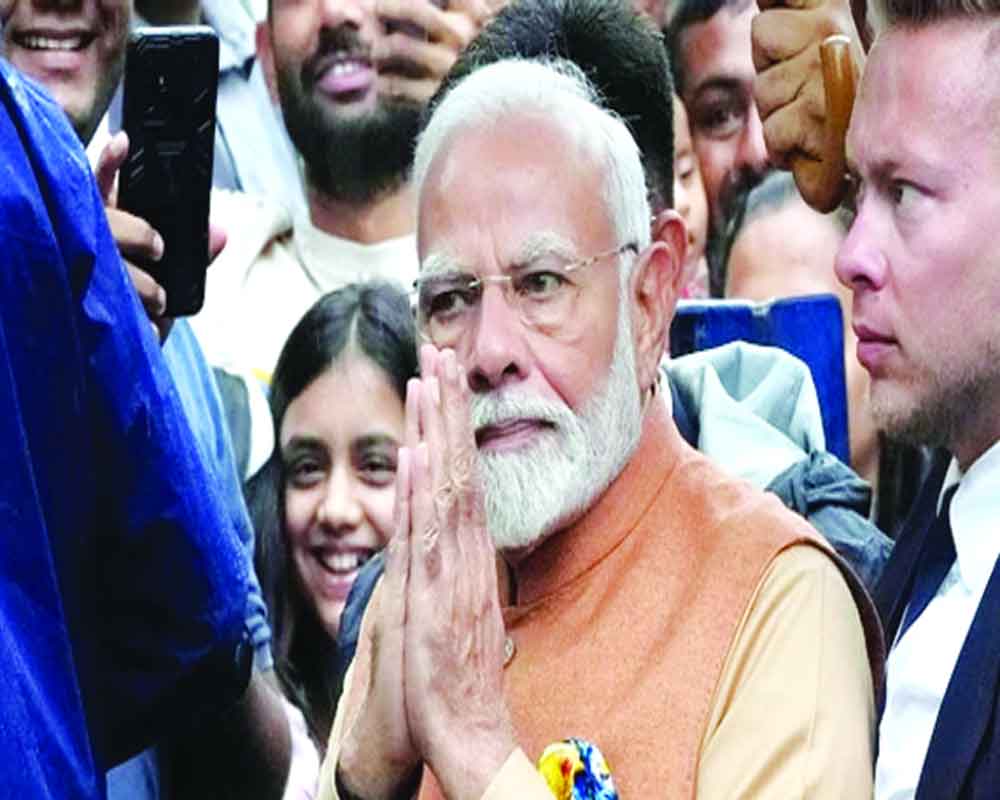PM’s visit underscores India's evolving role on the world stage, where it seeks to navigate complex alliances and assert its national interests
Prime Minister Narendra Modi’s visit to Kyiv marks a significant moment in international diplomacy, reflecting India's strategic balancing act between Russia and the West amid the ongoing conflict in Ukraine. As the first leader from a nation that maintains strong relations with both Russia and Western countries, Modi’s visit sends a nuanced message to global powers, particularly Russia.
While some observers suggest that Modi’s visit is intended to placate Western disappointment following his two recent visits to Russia, the reality appears more complex. Modi’s trip to Ukraine serves primarily as a subtle signal to Moscow that India can engage with Ukraine as well. This visit comes at a critical time, coinciding with Ukraine’s recent military successes against Russian forces, adding weight to the message Modi intends to deliver.
India's historical relationship with Ukraine has been far from warm, yet the scale of suffering in Ukraine has stirred sympathy within India. This sentiment is reflected in Modi’s earlier statements, emphasizing that this is not an era of war and advocating for peaceful resolutions. Despite this, India has refrained from condemning Russia's actions, continuing to purchase oil from Moscow, which has been crucial for Russia during the conflict.
However, Russia's increasingly close ties with China have become a point of concern for India, particularly regarding China's aggressive behavior along the Indian border. The 2020 Galwan Valley clash and subsequent military tensions have strained India-China relations, making Russia’s perceived indifference to India’s security concerns troubling. The frequent meetings between Russian President Vladimir Putin and Chinese President Xi Jinping have heightened these concerns, prompting India to reassess its foreign policy strategy.
Modi's visit to Ukraine can be seen as a diplomatic effort to subtly pressure Russia into reconsidering its relationship with China. By engaging with Ukraine, India signals to Moscow that its close ties with Beijing cannot be taken for granted without potential consequences. Historically, India has enjoyed a strong relationship with Russia, especially in defense, but the evolving geopolitical landscape requires India to prioritize its national interests.
Modi’s visit also underscores India’s independent foreign policy, a principle that has guided the country since the Cold War era. India has long prided itself on its non-aligned stance, making decisions based on strategic interests rather than aligning with any particular bloc. This approach remains relevant in the 21st century, as India navigates the complexities of global politics.
India’s refusal to outright condemn Russia at the United Nations has caused friction with Western capitals. However, Modi’s visit to Ukraine demonstrates that India’s neutrality does not imply inaction or tacit approval of Russian aggression. Instead, it reflects a nuanced approach, balancing relationships and interests while encouraging Russia to reconsider its military strategy.
As India seeks to strengthen its ties with Western nations, particularly in the Indo-Pacific region where China's assertiveness is a growing concern, Modi’s visit to Ukraine reaffirms India’s commitment to a multipolar world. India values its strategic autonomy, making decisions based on its national interests—a stance that has occasionally drawn criticism from its allies.
Another important aspect of Modi’s visit is India's interest in contributing to Ukraine's reconstruction efforts. The war has left Ukraine in ruins, and India sees an opportunity to play a role in its rebuilding process. This involvement would not only be a humanitarian gesture but also a strategic investment that could benefit the Indian economy. India has already provided humanitarian aid to Ukraine, and Modi’s visit could pave the way for more substantial support, including infrastructure projects and logistical assistance, which would also benefit related Indian industries.
Furthermore, India’s involvement in Ukraine’s reconstruction could serve as a counterbalance to China’s Belt and Road Initiative (BRI). By offering an alternative model of development cooperation that respects the sovereignty of partner countries, India positions itself as a more favorable partner for nations in need. This approach aligns with India’s broader goal of positioning itself as a global leader and a moral force in international diplomacy.
As the world closely watches Modi’s visit to Ukraine, the potential outcomes could have far-reaching implications for global power dynamics. Should Modi's diplomacy contribute to a ceasefire between Russia and Ukraine, India could emerge as a significant peacemaker and problem solver on the world stage. This would enhance India's reputation as a nation capable of navigating complex geopolitical landscapes while maintaining its principles and strategic autonomy.
(The writer is a senior journalist who has been covering foreign affairs for many years; views are personal)
























